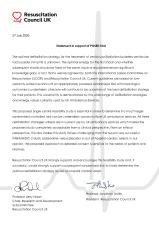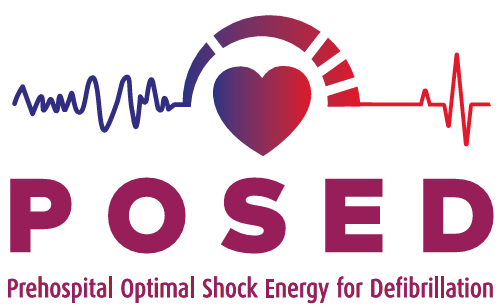Frequently Asked Questions
Health Professionals
Where and when will the study run, and who is involved?
This is a 2-year trial funded by the National Institute for Health Research (NIHR) that will involve South Central Ambulance Service (SCAS). Recruitment of patients is to start in October 2020. The trial is funded until April 2023 to allow time for analysis and publication of the results.
What is this study aiming to do?
This is a feasibility study which would lead to a large-scale study, the aim of which would be to identify the best shock strategy when using defibrillators to treat out-of-hospital cardiac arrests.
Why are you investigating this?
Most defibrillators in the UK are pre-set to deliver shocks to adult patients suffering cardiac arrest using three different energy levels: low, medium and high. Depending on the model, these are either 120, 150 and 200 joules or 200, 300 and 360 joules, depending on the type of defibrillator. Guidelines from Resuscitation Council UK suggest 150 joules as the starting level, or to follow manufacturer’s guidance. However there is little evidence to show if there is any difference in patient outcomes and current practice is inconsistent. By comparing the effectiveness of defibrillation at different energy levels we can determine whether there is potential for further research to refine defibrillator resuscitation techniques.
How will you investigate it? What does the study involve?
Patients attended by the participating Ambulance Service will be treated with a defibrillator randomly allocated to deliver a first shock at one of the three energy levels used in current practice: 120, 150 and 200 joules. When attending an adult patient undergoing a cardiac arrest, paramedics will deliver all resuscitation treatments as they would do normally, varying only the shock energy level. If more than one shock is required, the energy level will be escalated, as it would be in normal practice, up to a maximum of 200 joules. As the patients will be unconscious at this time, permission is being sought from the NHS Research Ethics Committee (REC) for deferred patient consent.
Data from the defibrillators on the energy levels used will be analysed alongside information on patient outcomes. There will be no control group or placebo as part of this trial.
What are the benefits to patients/the general public?
Survival rates for out-of-hospital cardiac arrests are low, and defibrillation is one of the few treatments known to be effective. Improvement to current defibrillator resuscitation techniques could reduce the length of time spent in cardiac arrest which has the potential to improve patient outcomes and increase the number of lives saved.
If my relative received a lower shock energy does this mean they had a lower chance of survival?
There is no evidence for this. All of the shock energies in the POSED study are currently used in clinical practice. None of them are ‘experimental’ levels of energy.
If the different shock strategies are in current use, why can’t you use existing data to compare them?
There are too many other factors (variables) that influence outcome and these need to be controlled in order to investigate the effect of defibrillation. Also, some of the outcomes under investigation are not routinely collected.
What is the primary outcome of the study?
The primary objective of this study is to establish whether it is feasible to conduct a large-scale definitive trial by establishing the number of eligible patients and the number recruited.
Is the study ethical?
All research studies run in the NHS are conducted in accordance with the UK Policy Framework for Health and Social Care Research and relevant legislation. The Health Research Authority (HRA) provides robust, ethical review of proposed research via independent Research Ethics Committees (RECs) who scrutinise applications and put the rights, safety, dignity and well-being of research participants at the centre of their decision making. RECs are entirely independent of research sponsors (that is, the organisations which are responsible for the management and conduct of the research), funders and investigators.
POSED will be conducted in full conformance with the principles of the Declaration of Helsinki and to Good Clinical Practice (GCP) guidelines. It will also comply with all applicable UK legislation, the Emergency consent framework, as approved by the REC and Warwick University Standard Operating Procedures (SOPs).
It is also important to highlight that all interventions proposed in the POSED study are existing standards of care currently employed in clinical practice and no experimental interventions are being investigated in this study.
Do patients give consent to take part in the study?
When a person sustains a cardiac arrest, they collapse unconscious almost straight away. It is not possible for them to give their consent in this situation. Due to the immediate need for treatment, it is not practical to ask a patient’s next of kin without causing harmful delays to the treatment of the patient.
The Mental Capacity Act (2005) sets out criteria by which it may be lawful to recruit patients to studies when they lack the capacity to make a decision about taking part. This applies if there is no alternative group of patients in whom this research can be carried out and is subject to approval by an appropriate ethics committee. Once the initial emergency has passed, a member of the research team will inform the patient, or their legal representative, about the study and seek their consent to participate in the follow-up aspect of the study.
If my relative was included in the study but did not survive, will I find out about their inclusion?
Unfortunately, most patients suffering out-of-hospital cardiac arrest will not survive. We have taken particular care to ensure that, at this difficult time, any unnecessary emotional burden is avoided whilst balancing the need for openness about the study.
The position taken by Patient Public Involvement (PPI) groups and investigators in previous trials which enrolled patients with cardiac arrest requiring time critical interventions, is that the burden of informing relatives of trial enrolment when the patient did not survive, outweighed the benefit. Therefore, to our knowledge, no trials in the UK have actively informed the relatives of those who did not survive.
To make sure this research is informed by current patient and public opinion, we have engaged extensively both with PPI groups and with researchers from around the world in deciding how best to approach this issue. We received differing opinions – some supported the prior position of not informing relatives whilst others felt that the principles of openness and transparency were most important and that by actively engaging with relatives this would preclude possible chance discovery in future which could provoke additional distress and set them back in the bereavement process. We have carefully considered the differing views and, on balance, consider that the best approach would be to inform relatives of the enrolment via a sensitively worded letter. We will monitor through the study how this approach is received by relatives and the public to inform future practice in this area.
Does this study have independent support?
The Chair of the Research & Development Committee and the President of the Resuscitation Council UK have written a statement of support and encouragement of this feasibility study.
What information is being collected from patients?
To undertake this study, the University of Warwick will be using information from patients’ medical records to try and find out which treatment works best. South Central Ambulance Service (SCAS) staff will collect information from patients’ ambulance care records and hospital records in accordance with the University of Warwick’s instructions as data controller. This means the University of Warwick are responsible for looking after patients’ information and using it properly. South Central Ambulance Service NHS Foundation Trust (SCAS) will collect information from patients and their medical records for this research study in accordance with our instructions.
Only information that is required for this research study will be collected. The University of Warwick will retain study data for a minimum of 10 years after the study has finished.
Will the data collected in the trial be kept confidential?
South Central Ambulance Service (SCAS) will keep names, NHS numbers and contact details confidential and will not pass this information to the University of Warwick. SCAS will use this information as needed, to contact patients and/or their GP about the research study, and make sure that relevant information for the study is recorded about their care, and to oversee the quality of the study.
All data collected for this trial will be passed to the University of Warwick using secure methods. It will be kept strictly confidential, stored in a secure and anonymised way, and only accessible to authorised staff at Warwick Clinical Trials Unit. The people who analyse the information will not be able to identify the patient and will not be able to find out their name, NHS number or contact details.
The patient’s rights to access, change or move information are limited, as we need to manage information in specific ways in order for the research to be reliable and accurate. If the patient withdraws from the study, we will keep the information about the patient that we have already obtained. To safeguard the patients, we will use the minimum personally-identifiable information possible. The University of Warwick will not hold personally identifiable information. Personal data will have a code number instead. Once we have finished the study, we will keep some of the data so we can check the results. We will write our reports in a way that no-one can identify anyone who took part in the study.
Information collected may also be shared with other research teams for future projects. Patient information will only be used by organisations and researchers to conduct research in accordance with the UK Policy Framework for Health and Social Care Research. This information will not identify the patient and will not be combined with other information in a way that could identify them. The information will only be used for the purpose of health and care research, and cannot be used to contact the patient or to affect their care. It will not be used to make decisions about future services available to patients, such as insurance.
What will happen to the results of the trial?
At the end of the study we will publish the findings in medical journals and at medical conferences. We will produce a report for the National Institute for Health Research (NIHR) who are funding the study. The patients will not be identified in any reports or publications resulting from the study. The trial results are expected to be made available toward the end of 2023 and will be posted on the POSED study webpage: https://warwick.ac.uk/fac/sci/med/research/ctu/trials/posed. Participants, their consultees and other interested parties will be offered the opportunity to be notified of the results of the study. Those wishing to receive the results will be sent a results information sheet which will be constructed in partnership with our patient and public advisory group.
Enquiries:
Email: POSED@warwick.ac.uk
Address: POSED study
Warwick Clinical Trials Unit
Warwick Medical School
University of Warwick
Gibbet Hill Road
Coventry
CV4 7AL
Resuscitation Council UK - Statement in support of POSED

View statement by clicking here.Link opens in a new window

Click here to go to the South Central Ambulance Service - Research pageLink opens in a new window

